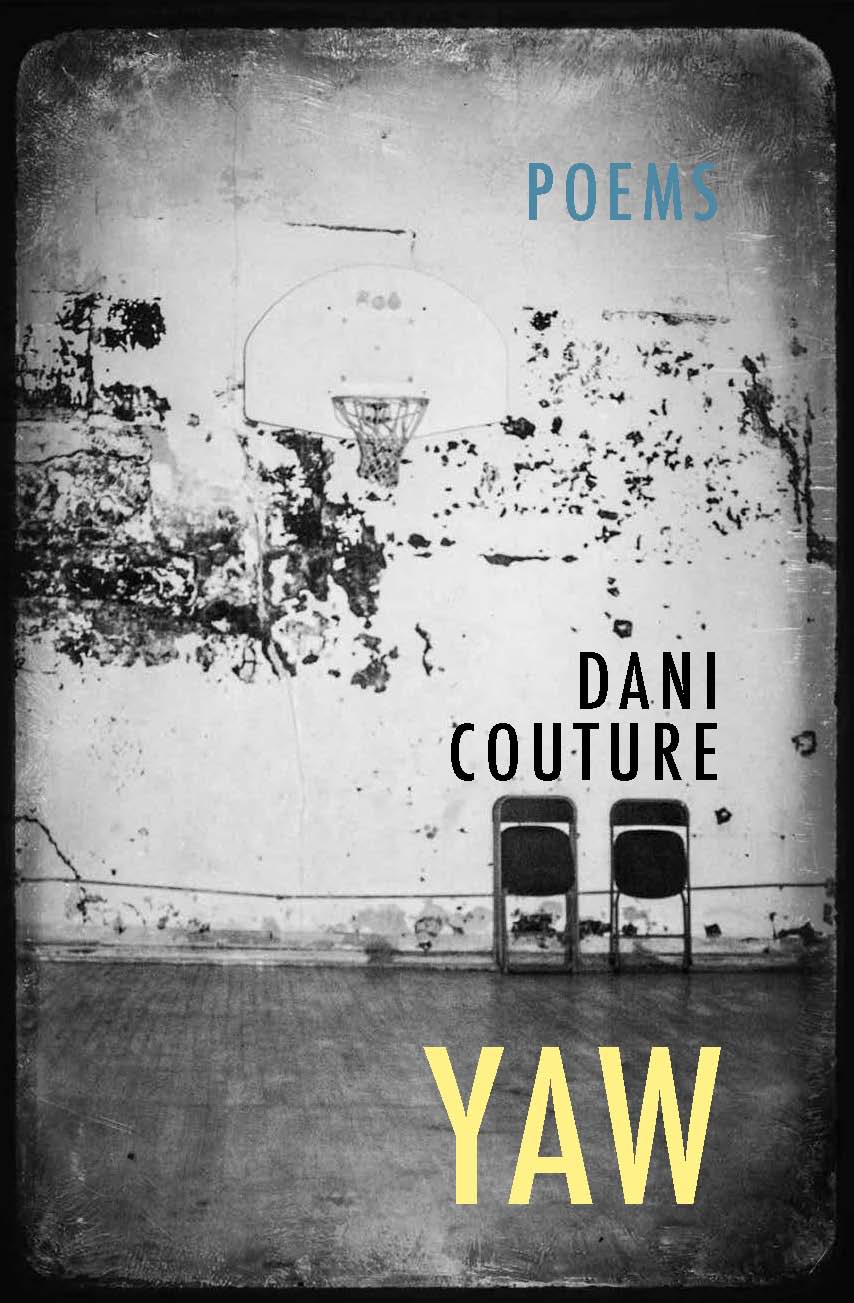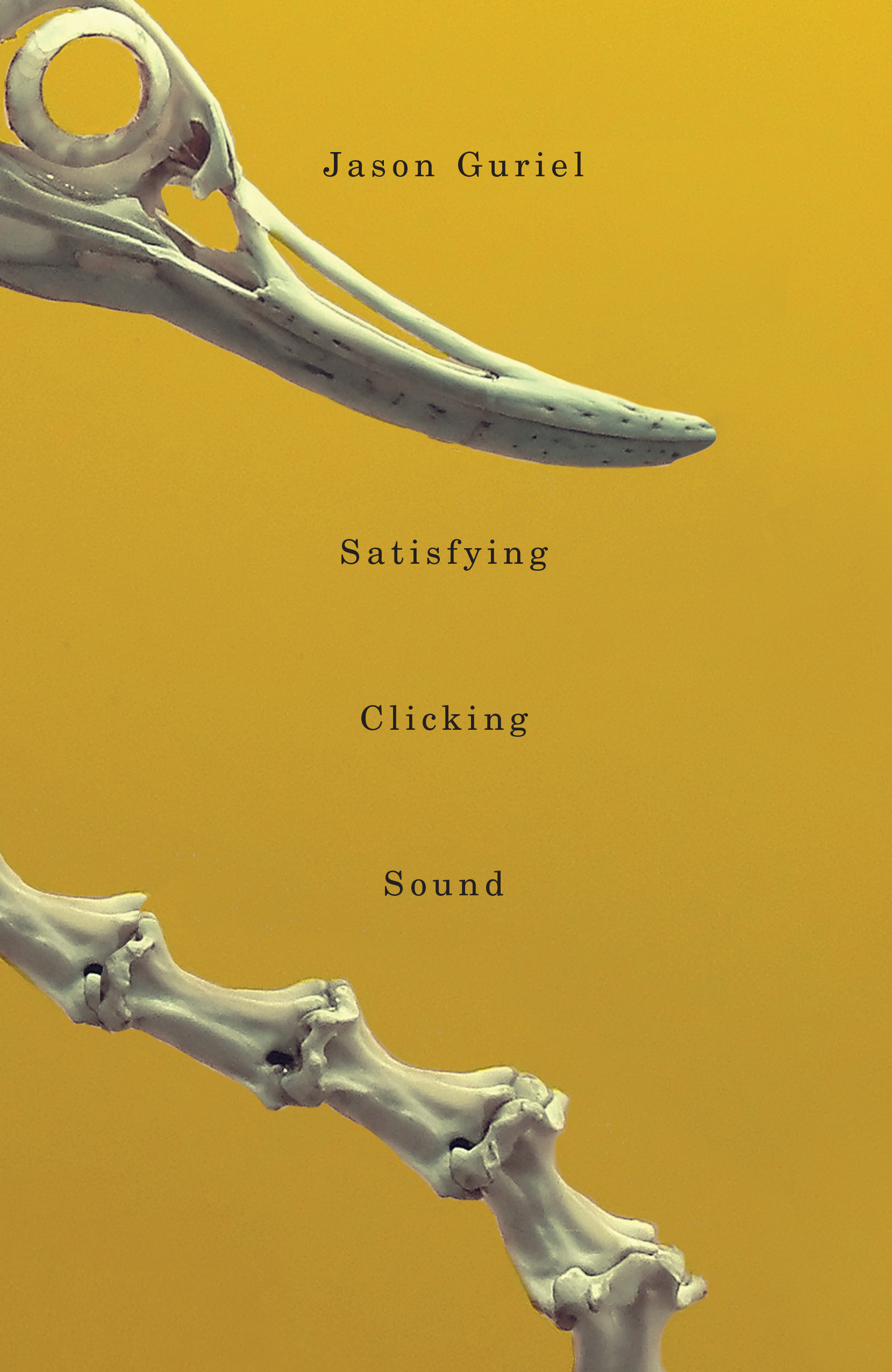Two Poets Discuss: Dani Couture's YAW and Jason Guriel's Satisfying Clicking Sound

Danny Jacobs: Dani Couture’s YAW (Mansfield Press) and Jason Guriel’s Satisfying Clicking Sound (Véhicule Press) are very different books. YAW works through grief; there’s some humour here but it’s undercut with much straight-faced elegy and dark imagery. The sky is not blue, we’re told, but “the colour of a jay,/ days dead and frozen to suburb sidewalk.”
Satisfying Clicking Sound, on the other hand, is light on its feet; its flush-fit short lines like the nudge and wink. YAW presents the reader with a narrative of mourning; the poems, with their connected underlying sense of unease, “guide us into the storm.” The poems in Satisfying Clicking Sound stand on their own as tightly wound little machines often working through discrete ideas (occasionally spurred by pleasantly odd epigraphs). Guriel enjambs his way through a poem, and rarely deviates from creating dense little Kay Ryan-esque USB sticks: “They seem to be/ nearly naked/ trees shedding/ a strategically-placed/ leaf apiece.” Couture will risk a more relaxed line that’s less flashy but equally beautiful (and perhaps more deeply felt): “Constellations of soft, blinking ship lights hang above the harbour.”
On a first look through the books, I thought The Waste Land vs. whimsy. One could argue that Couture’s subject matter is more “serious” than the sometimes tongue-in-cheek and cheeky experiments Guriel goes in for. Yet both books contain fine poems. Does a song to a speed bump, if deftly done, carry as much artistic heft as moving sustained elegy? The books got me thinking about what I’ll call poetic intention—does it matter what poets write about, so long as it’s done well?
Daniel Renton: A poem like “Elegy” in YAW, with its painfully disembodied addressee, might mean more—i.e. have greater artistic heft—for a reader in mourning than Guriel’s “Looking at People listening to Nico.” But that’s as much about personal taste as it is about close analysis. Good poets, and good readers, know subject and craft are only separable in an abstract sense.
That said, nudge-and-wink poetry done well can be taken too far. Guriel is after the click of Yeats’ well-made box. His ambition is to work any click-type sound into a satisfying music: a dusty record, drumming rain, a steady heartbeat, the whip of an eyelash—even, as you mentioned, the singing of a speed bump: “I’m too dull to be cutting / anything, let alone edge, / but far too jarring / to be middle / of the road.” Poetry “deftly done” is his real subject. The question is whether this strategy can weather an entire book. It’s interesting, for example, to see you write out those lines from Guriel’s “Foliage” unbroken. They still echo the metronome of their original line breaks, just not so garishly. I’ll admit this could be my problem. But why doesn’t Guriel see the warning in that epigraph he quotes about how Steve Jobs pushed his engineers to perfect the clicking sound of the iPod? Why isn’t he anxious that poetic embodiments of perfect clicking, far from being satisfying, might grate upon the ear? When I bought my first iPod, the first thing I did was turn off that annoying menu sound.
DJ: I sympathize with your desire for a bit more variation in Guriel’s line length, rhythm, and form, but I don’t agree that Satisfying Clicking Sound’s music approaches a garish metronome. The book attempts to perfect a quick and clicking line and, in many cases, the poems thrive in their short-line form. In “Claustrophobia,” Guriel addresses a reviewer of his previous book who—we read in the epigraph—thought the poems too precise (you can almost hear Guriel spitting his beer then going Huuuuh?). The poem riffs on an image of a room that “holds no more/ than your dimensions” and then goes on to say that such a room “still/ has way too much/ in the way/ of wiggle room.” The message is clear: wiggle room creates chaff.
DR: I do wonder if Guriel’s well-made box may be a bit of ruse—his poems might be closer to being Chinese finger traps. That is, toys that snare unsuspecting victims who misunderstand their serious mission: to encourage us to relax our grandiose poetic posture and enjoy the play of language. Take this string of lines from “Knuckleball:" “its bottleneck— / the chewed-over / or coughed-up / or otherwise / indigestible morsel / of food for lines, / wobbly ones, / of thought.” Notice the purposely wound up syntax? The poem so mimics R. A. Dickey at the plate it practically wears a Blue Jay’s jersey. The clicking in those lines isn’t just sound effect, it’s wit. Unfortunately, I find it easier to analyse Guriel’s wit than to enjoy it. The problem with humour in poetry is that the louder it tends to scream, “Look how clever I am!” the less it makes you laugh. Satisfying Clicking Sound suffers most from recycling it's own easy tricks such as surprise enjambment: “poor old Ecclesiastes is dead / wrong about nothing / new under the sun.” That said, I agree the result is stunning when the clicking is fresh, as in the title poem: “Or is it a richer sound— / a couple of castanets / cut from the bones of a pair / of Marie Antoinettes.”

DJ: Maybe we should bring in YAW here, and Couture’s ability to yaw from any straight-and-narrow tonal or formal strictures. YAW, as a title, isn’t just appropriate because boats and barges abound in Couture’s book; the book seems to enact a a course-change in mourning for the poet’s “would-be husband.” There is acceptance in this book. Perhaps not of the loss, but of learning to live with being haunted, to always be “the unanswered phone and the caller untethered.” The book is an honest and (mostly) unsentimental conversation with, and answer to, “A voice bent/ and coming/ from somewhere/ else.” The poems also use a range of poetic strategies—anaphoristic incantations, villainelles, loping free verse, haiku-small fragments, and even Guriel-short short-line pieces. But does YAW, on the rare maudlin occasion, veer too hard starboard and run aground on the crags of its own grief?
DR: I agree that YAW is a wonderfully apt title. Like elegy, the word is ambivalent. It implies, as you say, an unexpected change in course but also a controlled manoeuvre—calculation despite the unpredictable: “a better chance of discovering / what the right path was all along.” The destination should stay fixed but death is unexpected. So the poems rethink the journey, through all its ends and means. YAW is a bit obsessive about difference and repetition as a means of coping with elegiac themes of lamentation, grief, consolation, meditation and acceptance: “Not your fault. Not your fault. Not your fault.” These poems dredge up a past fraught with misplaced hope. “1999” recalls that after the banal disappointment of that most anti-climactic of all New Year’s eves, “Our message was immediate and clear: / we had expectations.”
At his best, Guriel works his medium into moments every bit as intense as YAW. Despite the unconvincing sentimentality of its ending, “My Father’s Stamps” teaches that even bric-a-brac can yield powerful poetic fruit: “these windows [my father] long ago / decided would go / together, even though they opened / onto different kinds of light / and weather.”
A few things readers of YAW will enjoy that we haven’t mentioned: formal invention drawn from conventional sources (“Corrections,” “Fact Check,” “Interview with the County Reporter”), the conflation of themes into running conceits (ruin, shipping, navigation, cats, repetition and difference, memory, history), and the sense of narrative (or mistrust of narrative) that the conceits provide. There isn’t much to complain about in YAW but I’m suspicious of shorter anaphora poems (Couture includes three) because I can’t help but feel that they fizzle out on account of a weak repeated phrase.
DJ: Guriel’s click might sometimes go stale but, for me, his technique still manages to surprise throughout much of the collection. So despite our differences—I suspect Guriel’s snapping short-line appeals more to my ear than yours— we can agree that Satisfying Clicking Sound contains fine moments of wit and irony well-wrought in a consistent and idiosyncratic voice. We can also agree that Couture’s zoom-lens on her subject rarely wavers; I think we’ve both underlined the poet’s impressive capacity to refresh a familiar theme through a variety of formal, rhythmic, and tonal choices.
DR: Here’s a last question for you. In Couture’s “Shipping & Receiving,” we read, “Heart’s never where you think it is.” In “Elegy,” “The heart / is a small, chambered abattoir until it’s not, / settled instead on some new task.” In Guriel’s “Claustrophobia” we get “Each rap of a hand / at the door is a blow / to the heart.” What or where is the heart of each of these books?
DJ: Couture’s poems wear their heart on their sleeves. The candid voice on display in YAW goes in for deep sentiment but rarely sinks into sentimentality. In many contemporary Canadian poetry books dealing in elegy and loss, we get the heart, but the gall bladder, too. The poetry book, especially when clearing 100 pages, can seem a bloated thing. But YAW contains just forty-seven pages of poetry. Couture intuits what to excise, what we can live without, and her short book holds only what’s necessary because “the dark spaces are heavy/ with so much” (“KIC 4862625”). Loss is distilled. The centre of the book, the heart of it, is found in its concentrated grief.
Satisfying Clicking Sound is short and polished, too (fifty-three pages of poems). I mentioned sleeves earlier and the speaker in a Guriel poem is telling: “The trick to writing/ well isn’t up/ the sleeve. It is/ the sleeve/ that fluffs up/ the flourish” (“John Hancock’s John Hancock”). Guriel is the consummate stylist, and every poem in Satisfying Clicking Sound has plenty of flourish. I don’t believe that every poem has to break your heart, but Guriel can hold the reader at a remove, especially when style overwhelms substance, when his cleverness goes cute. Guriel, like many great stylists, sometimes sacrifices pathos for pizzazz. Guriel can be at his strongest when he lets more feeling in; one thinks of the poems about his father (My Father’s Stamps” and “The Washbasin”) and the brilliantly constructed extra-lined sonnet addressing the poet Samuel Menashe (“Poetry Is Barbarous”).“Heart” is a slippery thing, and I realize in your question you were probably referring not to emotional thrust but something like location—what or where is the centre, the core concerns to be found? The heart of Satisfying Clicking Sound is in its steady and healthy beating; an unsuccessful poem, the book suggests, falters like a weakening heart. As Guriel warns in the title poem, “Whatever it better/ resound.”
Danny Jacobs' first book of poems, Songs That Remind Us of Factories (Nightwood), came out in 2013. His poems have been published in a variety of journals across Canada.
Daniel Renton has been published in many Canadian journals, including Prism International, Hazlitt, CV2 and the Fiddlehead. His chapbook is forthcoming with Frog Hollow Press.





